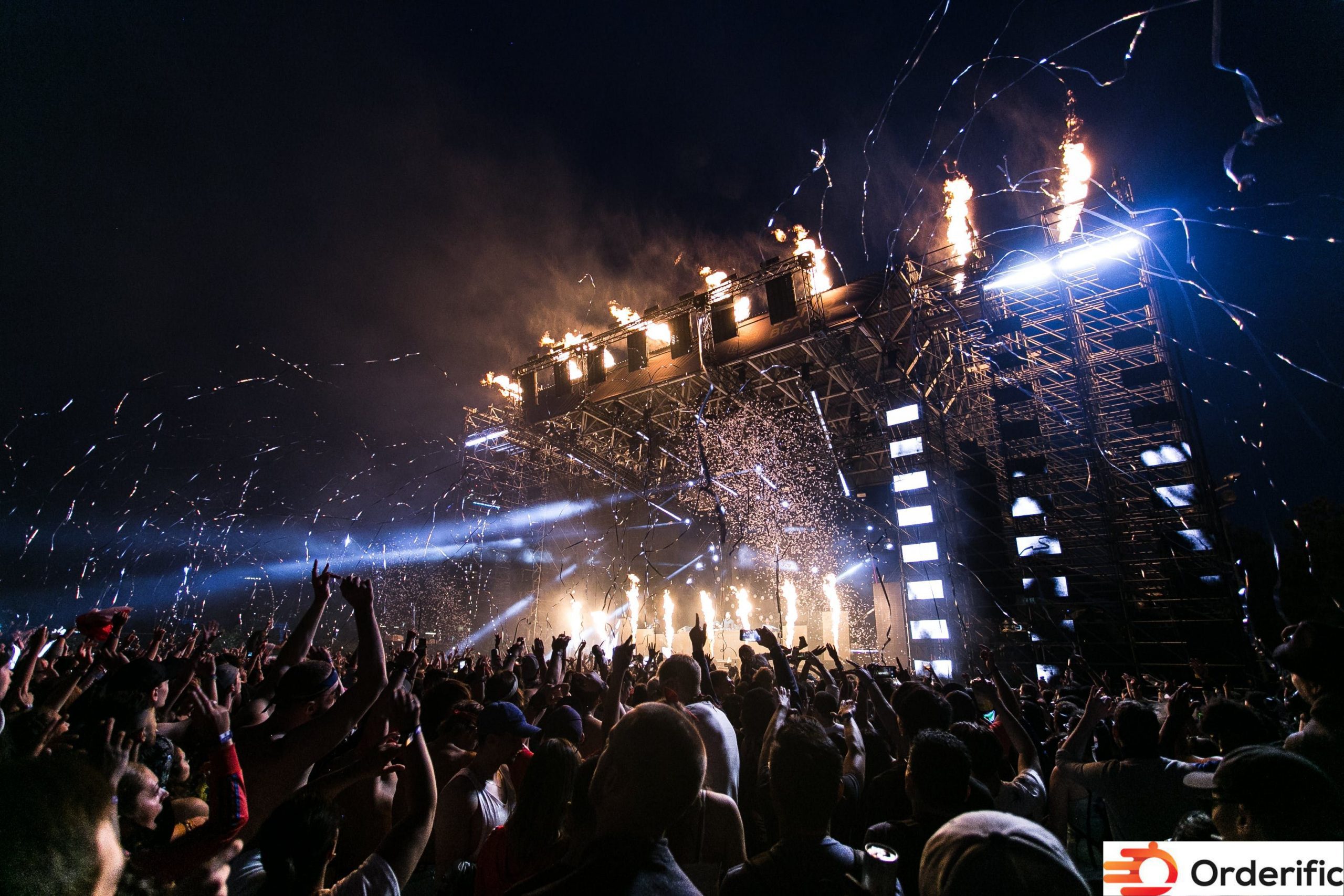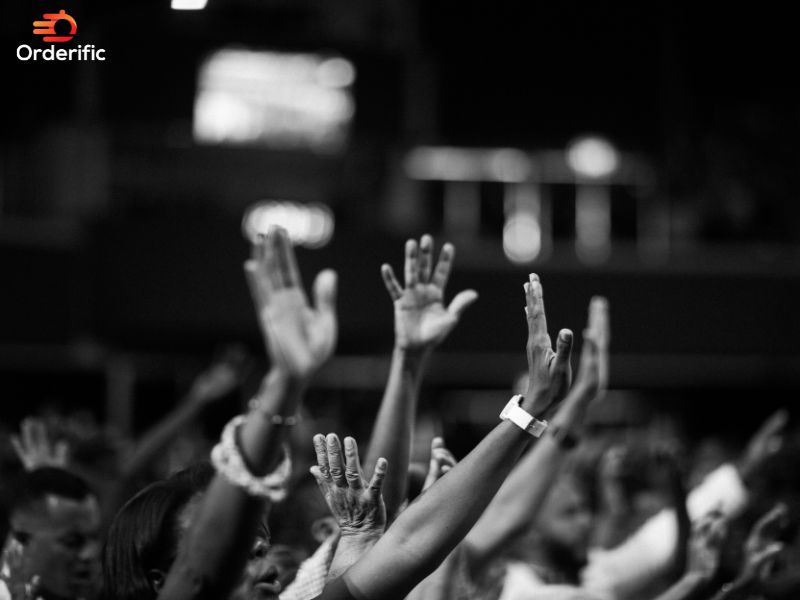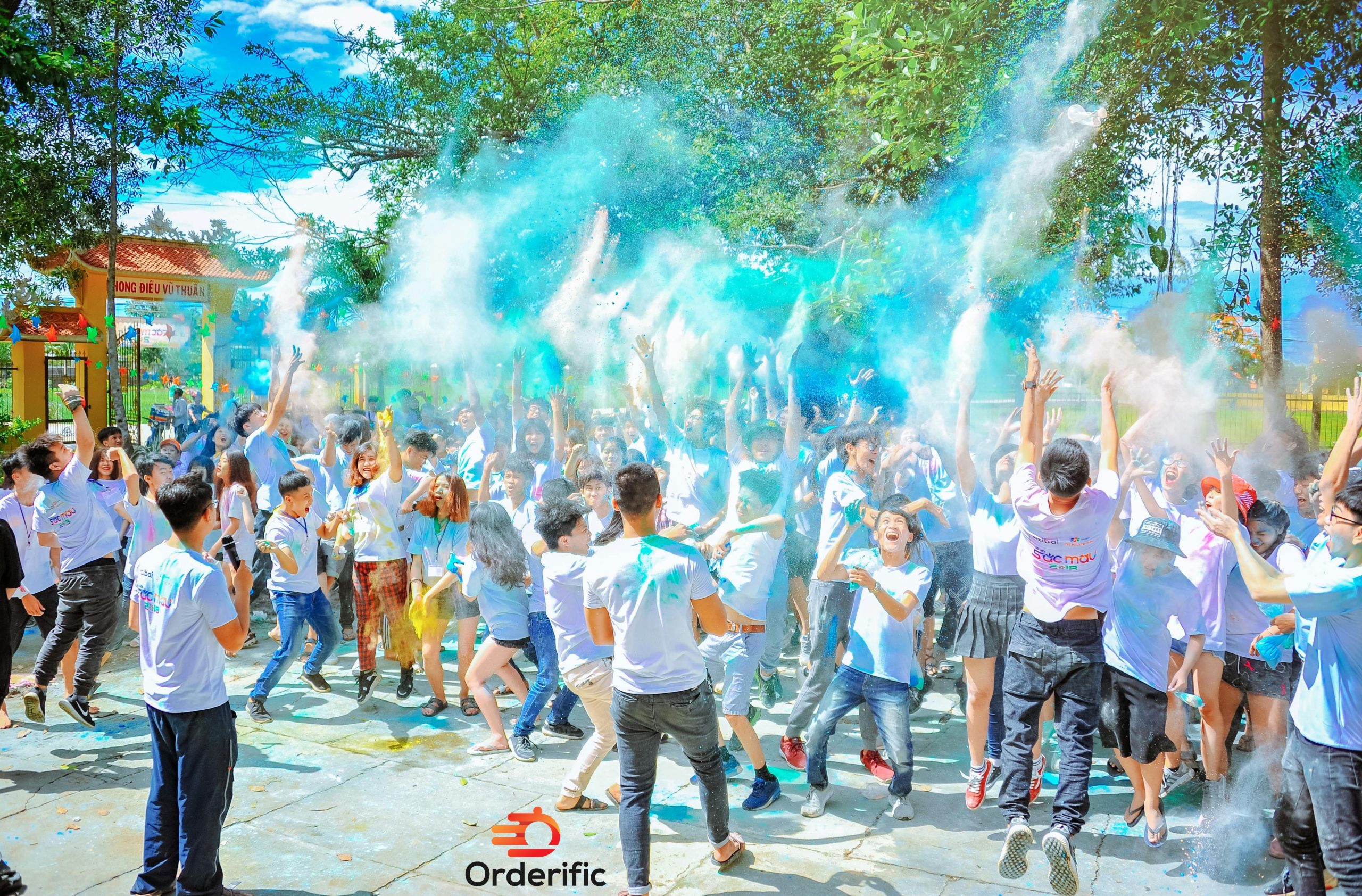Introduction
In the dynamic world of event planning, utilizing event management software has become essential for creating a successful event that leaves a lasting impression. This tool is pivotal in streamlining the process, from event registration to attendee engagement. Event branding, in particular, is a critical aspect that event planners pay meticulous attention to. It’s not just about organizing an event. It’s about creating an experience that resonates with the attendees, making your event brand unforgettable. Whether you’re planning corporate, virtual, or hybrid events, strategic application of event marketing tactics is necessary. With management software like Webex Events, future events can be planned more efficiently, ensuring an ideal environment for event organizers and attendees.
What Is Event Branding?
Event branding is a powerful marketing strategy that leverages the capabilities of event management software to create a truly distinctive and unforgettable identity for each event. This carefully crafted event brand is meticulously designed by skilled event planners, aiming to evoke a wide range of specific emotions and reactions from attendees, influencing their perception and overall experience of the event profoundly.
The concept of event branding goes far beyond just a logo or a tagline. It permeates every aspect of an event, from the initial event registration process to the ongoing strategies for fostering attendee engagement. By seamlessly integrating the event brand into all touchpoints, attendees are immersed in a cohesive, immersive experience that resonates long after the event.
When implemented effectively, event branding creates a powerful connection between the event and its attendees, leaving a lasting impression that extends far beyond the confines of the event itself. It enhances the overall event experience, builds brand loyalty, and fosters community among attendees. With its ability to shape perceptions and emotions, event branding is a vital tool in the arsenal of event planners, ensuring the success and impact of their events.
The Role Of Event Management Software In Event Branding
Event management software plays a crucial role in the development and execution of successful event branding strategies. By offering a centralized platform, this software empowers event planners to seamlessly plan, track, and execute all branding-related tasks, ensuring a cohesive and consistent event brand is effectively communicated across every stage of the event. One notable example is Webex Events, a powerful software that goes beyond just event registration, enabling event organizers to seamlessly integrate the event brand into every aspect of the attendee’s journey, right from the initial touchpoint. From personalized email invitations to branded event landing pages, every interaction is an opportunity to reinforce the event’s unique identity and create a memorable experience for attendees. With such comprehensive event management software, event organizers can truly elevate their event branding efforts and make a lasting impact on their target audience.
Enhancing Attendee Engagement Through Event Branding
A well-crafted event brand can significantly enhance attendee engagement. By utilizing powerful event management software, event planners can go beyond traditional approaches and create truly personalized attendee experiences. This includes tailoring content and interactions to align with the event brand, capturing the attention and interest of attendees in a more profound way. These personalized experiences not only leave a lasting impression but also foster a deeper connection between attendees and the event brand, resulting in increased loyalty and repeated attendance at future events. With every interaction, the event brand becomes a beacon that guides attendees on a memorable and immersive journey, ensuring a remarkable and unforgettable event experience.
The Impact Of Event Branding On Corporate Events
In the context of corporate events, event branding plays a vital role in promoting the corporate identity and values. It goes beyond just logos and colors; event branding encompasses the entire experience and perception attendees have of the event and the corporation itself.
By leveraging event management software, event planners can ensure that every aspect of the event aligns with the corporation’s brand. From the registration process to the event signage, everything is carefully designed to reflect the corporate identity and values. This attention to detail creates a cohesive and memorable experience for attendees, reinforcing the corporation’s brand.
Furthermore, event branding provides a platform for the corporation to engage with attendees in a manner that reinforces their corporate identity. Through well-executed branding strategies, corporations can establish a strong connection with attendees, fostering trust and loyalty. This connection extends beyond the event itself, as attendees carry the positive brand experience with them, becoming brand advocates in their own networks.
Event Marketing And Event Branding
Event marketing strategies play a critical role in shaping and enhancing event branding. These strategies, implemented using advanced event management software, go beyond mere promotion and aim to effectively communicate the essence of the event to prospective attendees. By leveraging various channels such as social media promotion, targeted email marketing campaigns, and regular website updates, organizers ensure that every touchpoint consistently reinforces the event brand, resulting in a cohesive and memorable brand experience for all participants.
The Future Of Event Branding With Event Management Software
Looking towards future events, the role of event management software in event branding is expected to grow. As technology continues to evolve, the capabilities of management software will expand, providing event planners with more tools and resources to craft unique and memorable event brands. Whether it’s a hybrid event, a virtual event, or a traditional in-person event, the importance of event branding will remain paramount in making each event a successful event.
By harnessing the power of innovative and user-friendly event management software, event planners can elevate their event branding strategies to new heights. With the ability to seamlessly integrate registration, ticketing, and attendee engagement features, this software empowers event organizers to create truly immersive and unforgettable experiences for their attendees. From personalized event websites to customized email communications, every touchpoint can be carefully curated to reflect the unique identity and values of the event brand. By leveraging the capabilities of event management software, event planners can establish a strong and enduring event brand that leaves a lasting impression on attendees and sets the stage for future success.
Why Is An Event Branding Strategy Necessary?
An effective event branding strategy is fundamental to the success of any event, be it virtual, hybrid, or in-person. It acts as a beacon, guiding attendees through the sea of numerous events, and making yours stand out. An event brand is more than just a logo or tagline; it is the embodiment of the event’s identity, values, and the unique experiences it offers. It conveys a promise to the attendees about what they can expect, and when executed well, it can evoke emotions, stimulate engagement, and create lasting memories.
Moreover, in the corporate sphere, an event branding strategy serves a dual purpose. Not only does it establish the image of the event, but it also reinforces the corporate brand, echoing its values and ethos. This strategic alignment ensures a consistent narrative that resonates with the attendees and strengthens their association with the corporate brand as well.
Also, an effective branding strategy aids in event marketing. It provides a cohesive theme that ties together all marketing initiatives, ensuring a consistent brand message across different channels. Whether it’s social media promotion, email marketing, or website updates, the event branding infuses each touchpoint with its distinct identity, thereby enhancing the overall brand experience.
In this digital era, event management software is the linchpin that holds an event branding strategy together. It provides a centralized platform to plan, implement, and monitor branding efforts, ensuring consistency and coherence. As technology continues to advance, the role of event management software is set to become even more pivotal, enabling event planners to devise innovative branding strategies and create unforgettable event experiences.
The Keys To Successful Event Branding Strategies

Success in event branding lies in meticulous planning and strategic implementation. With the assistance of event management software, these strategies can be effectively put into action. A successful event branding strategy typically includes the following key components:
- Unique Identity: The event must have a distinct personality that separates it from others. This includes a unique logo, color schemes, and themes that are consistent across all event elements.
- Consistency: The event branding should be consistent across all platforms, be it on the event’s website, social media channels, or physical signage at the event itself. Event management software helps maintain this uniformity.
- Attendee Engagement: A well-crafted event brand creates an emotional bond with the attendees. Personalized messaging and interactive experiences designed around the brand can significantly enhance engagement.
- Alignment with Corporate Brand: In corporate events, the event brand should align with the corporation’s brand identity, reinforcing and promoting its values.
- Strong Marketing: The event brand should be communicated effectively through comprehensive marketing initiatives. Social media promotion, email marketing, and website updates should consistently represent the event brand.
- Utilization of Technology: Event management software is a powerful tool in executing successful event branding strategies. It provides a centralized platform to plan, execute, and monitor branding efforts, ensuring consistency and success.
By adhering to these strategies, event planners can create an impactful brand for their events, leading to increased visibility, memorable experiences, and higher attendee engagement.
The Top 13 Event Branding Strategies And Ideas
1. Creating A Meaningful Brand Identity
Creating a meaningful brand identity is the cornerstone of any event branding strategy. This goes beyond simply designing a captivating logo or choosing a catchy name. It involves crafting a unique personality and story for your event that resonates with your audience. Your event’s brand identity should reflect the purpose, values, and experiences that your event promises to deliver. It is the foundation upon which all your other branding elements will be built, such as your color scheme, typography, visual imagery, and messaging. By establishing a strong, meaningful brand identity, your event will stand out in the minds of attendees, setting a positive tone for their expectations and experiences. Event management software can facilitate this process, helping you to create, manage, and consistently apply your brand identity across all event stages and marketing channels.
2. Leverage Visuals For Better Engagement
Visuals play an instrumental role in event branding, capturing attention and conveying your event’s essence in a way that plain text can’t. They have the power to create an instant emotional connection with your audience. From event logos and banners to posters and social media posts, visuals should consistently represent your event brand. Every visual element contributes to the overall perception of your event, so make sure they align with your brand identity. Event management software can streamline the process, ensuring all visuals are consistent and on-brand. For instance, you can use templates for email invitations or social media posts that adhere to your event’s color scheme and typography. Remember, your event’s visual appeal is what can make it memorable for your attendees. So, make the most of it by creating striking, consistent, and meaningful visuals.
3. Crafting A Unique Brand Story
A compelling brand story is a powerful tool that can significantly enhance your event branding. Your brand story is more than just a narrative; it is the embodiment of what your event stands for, its mission, its values, and what makes it unique. It is a way to connect with your audience on a deeper, emotional level, giving them a reason to care about your event and to become involved in its journey.
When crafting your brand story, consider the purpose and objectives of your event, the experiences you want to offer, and the message you want to convey to your audience. Make it authentic, relatable, and memorable. Your brand story should be reflected in every aspect of your event, from your website content and promotional materials to your social media posts and email communications.
Event management software can be an invaluable tool in telling your brand story. It allows you to consistently communicate your story across various platforms and touchpoints, ensuring that your audience experiences the essence of your brand at every interaction. With a compelling brand story, you can create a lasting impact on your attendees, making your event memorable and encouraging greater engagement.
4. Incorporating Social Media Strategies
Social media has become an integral part of event branding strategies. It’s a platform where your event’s voice, personality, and messaging can be broadcasted to a large audience. When used effectively, social media can generate buzz, drive engagement, and foster a sense of community around your event.
Start by identifying the platforms that your target audience frequents the most. Use these platforms to share content that resonates with them, keeping in line with your event’s branding. This could be anything from behind-the-scenes sneak peeks to engaging posts that reflect your event’s values and identity.
Leverage event hashtags to create a virtual conversation hub and encourage attendees to share their experiences. This not only amplifies your event’s visibility but also strengthens your brand’s identity through user-generated content.
Additionally, social media can be a highly effective tool for real-time interaction with your attendees, answering queries, and getting immediate feedback. This two-way communication helps create a personalized experience, promoting greater attendee loyalty and engagement.
Remember, consistency in your brand’s voice and visuals across all social media platforms is key. It solidifies your event’s identity and makes it more memorable. Event management software can help maintain this consistency, allowing you to seamlessly manage and monitor your social media efforts.
5. Analyzing Your Audience And Creating Personas
Understanding your audience is a critical aspect of event branding. By analyzing your target demographic’s interests, behavior, and preferences, you can tailor your branding strategy to better resonate with them. This involves creating audience personas – detailed representations of your key audience segments.
These personas should incorporate various characteristics such as age, occupation, interests, challenges, and what they seek from an event like yours. By leveraging these insights, you can craft a brand that truly speaks to your audience, fostering a deeper connection. For instance, your messaging tone, visual elements, or even event features can be adjusted to align with your personas, making your event more appealing to them.
Event management software can assist in gathering and analyzing audience data, enabling you to create accurate personas. This tool can also help maintain a uniform brand experience tailored to these personas across all platforms, ensuring your branding efforts remain effective and consistent.
Remember, when your event branding echoes the expectations and interests of your audience, it enhances their engagement and loyalty, making your event a memorable experience for them. So, take the time to understand your audience and let this understanding shape your event brand.
6. Creating A Memorable Tagline
A memorable tagline is an essential component of event branding. This short, catchy phrase serves as the encapsulation of your event’s identity and mission, conveying in a few words what your event stands for and what attendees can expect from it. An impactful tagline instantly grabs attention, sets your event apart from others, and leaves a lasting impression on attendees. When crafting your tagline, focus on the unique aspects of your event, the experiences it offers, and the emotions it aims to evoke. Make it relatable, inspiring, and memorable. Remember, consistency is key – the tagline should be consistently used across all your event’s promotional materials and touchpoints. Event management software can help you keep track of this, ensuring your tagline is effectively integrated into your branding efforts.
7. Developing A Comprehensive Event Marketing Plan
A comprehensive event marketing plan is an essential part of an effective event branding strategy. This plan should outline your goals, target audience, marketing channels, and tactics for promoting your event brand. Your marketing initiatives should aim to convey your event’s identity and value proposition, fostering anticipation and excitement amongst potential attendees. This includes everything from targeted email campaigns and SEO-optimized website content, to engaging social media posts and compelling ad creatives. Each marketing touchpoint should consistently echo your brand, creating a cohesive brand experience that boosts recognition and recall. Additionally, consider leveraging influencers or partnerships to broaden your reach and enhance your event’s credibility. Remember, effective marketing is not just about reaching a large audience, but about reaching the right audience with the right message.
Event management software can significantly aid in planning, executing, and monitoring your event marketing efforts, providing valuable insights to optimize performance and maximize attendee engagement. By aligning your marketing plan with your event branding strategy, you can ensure a powerful brand presence that captivates your audience and sets the stage for a successful event.
8. Leveraging Influencers To Promote Your Event
Influencer marketing is a powerful tool in event branding, especially in the digital age. When influential figures in your industry promote your event, it not only expands your reach but also enhances your event’s credibility and appeal. Start by identifying influencers who resonate with your event’s vision and audience. These could be industry experts, popular bloggers, or social media celebrities. Once you’ve established a partnership, they can help spread the word about your event through their platforms, sharing event updates, behind-the-scenes content, or even their personal experiences during the event. This creates a buzz around your event and fosters trust among potential attendees. Besides, user-generated content from influencers can be repurposed for your event’s promotional materials, adding authenticity to your brand.
Event management software can track the impact of these initiatives, providing valuable insights into engagement and conversion rates. With strategic influencer partnerships, you can amplify your event branding and create a more impactful and widespread presence in your industry.
9. Generating Word Of Mouth Through Advocacy Programs
Word-of-mouth marketing, driven by advocacy programs, is a potent tool in event branding. Advocacy programs involve turning your loyal attendees into brand advocates, who then promote your event in their network, generating organic buzz and credibility. This not only amplifies your reach but also enhances trust in your event brand, as recommendations from friends or colleagues are often seen as more reliable than direct brand messages. You can encourage advocacy by offering incentives like discounts, VIP access, or exclusive merchandise to attendees who share your event on their social media, refer a friend, or engage in other promotional activities. Remember to make it easy for your advocates to share your event by providing them with shareable content that reflects your brand identity, such as branded images, pre-written tweets, or hashtags.
Event management software can track these advocacy efforts, helping you understand its impact on your event’s visibility and attendee engagement. Leveraging advocacy programs in your event branding strategy can create a powerful ripple effect, enhancing your event’s reputation and reach.
10. Investing In An Event Management Software
Investing in event management software is a strategic move to fortify your branding efforts. It provides an integrated platform to manage and harmonize all aspects of your branding, ensuring consistency, enhancing efficiency and delivering a unified brand experience. The software offers tools for creating and managing visual assets, developing and implementing event marketing plans, analyzing audience data, and fostering social media engagement, among others. Moreover, it empowers planners to track their branding efforts across various touchpoints, providing valuable insights that can be used to optimize engagement and improve future strategies. Therefore, by embracing management software, event planners can streamline their processes, save time and resources, and ultimately, create a more impactful and memorable event . Remember, a strong event brand is a key driver of event success, and investing in event management software can be a game-changer in your event branding journey.
11. Developing Unique Swag Ideas To Further Engage Attendees
Creating unique, branded swag is an excellent way to engage attendees and extend the presence of your event beyond the venue. Swag items or event giveaways can range from everyday items like t-shirts, mugs, and tote bags to tech gadgets or customizable products that bear your event’s logo or tagline. These items serve as a constant reminder of the event, prolonging the experience for attendees and reinforcing your brand identity. Moreover, they can generate excitement on social media as attendees share pictures of their swag, expanding the reach of your event.
To make the most impact, it’s crucial to be thoughtful with your choices. Select items that are practical, align with your event’s theme or cause, and resonate with your target audience. So, This ensures that your swag remains useful and memorable long after the event.
Using event management software can streamline the process of organizing, tracking, and managing the distribution of swag items effectively. Thus, This technology helps event planners stay organized and ensures that every attendee receives their swag without any hassle.
By incorporating unique swag into your branding strategy, you can leave a lasting impression on attendees, boosting brand recall and loyalty. Furthermore, The tangible nature of swag creates a connection between your brand and the attendees, making them feel valued and appreciated. Hence, This positive association can translate into long-term support and advocacy for your brand.
In summary, utilizing branded swag as part of your strategy is a powerful way to engage attendees, extend your event’s reach, and reinforce your identity. Hence, By carefully selecting practical and impactful items, leveraging event management software, and focusing on creating a memorable experience, you can maximize the impact of your swag and leave a lasting impression on attendees.
12. Capturing Data As Part Of The Event Promotion Process
Data capture is not just important, but a crucial and indispensable part of the event promotion process. It goes beyond simple information gathering, as it offers valuable insights that can significantly enhance branding strategies. By collecting and analyzing data such as attendee demographics, registration patterns, session attendance, and social media engagement, event planners can gain a deep understanding of their audience’s interests, preferences, and behaviors. Armed with this knowledge, they can create a brand that truly resonates with their target audiences.
Moreover, event management software plays a pivotal role in streamlining the data collection process. It provides a centralized platform that allows for efficient tracking, analysis, and utilization of data. With real-time reports and timely insights at their fingertips, event planners can take immediate action when necessary. For instance, if the data indicates that a particular marketing channel is not performing as expected, adjustments can be swiftly made to optimize the strategy.
The benefits of effective data capture go beyond branding. It also plays a crucial role in personalizing the attendee experience. By understanding the preferences and behaviors of attendees, event planners can tailor their offerings and create a more engaging and tailored experience. This not only positions the brand favorably in the minds of attendees but also ensures the success of the event itself.
In summary, data-driven branding is not just a buzzword; it is a key element in understanding your audience and delivering an event that goes above and beyond their expectations. So, make data capture a top priority and harness its power to create unforgettable experiences that leave a lasting impression on your attendees.
13. Offering Unique Experiences With Special Guests
Offering unique experiences through the presence of special guests is a powerful strategy for enhancing your event branding. So, Special guests could include industry experts, well-known speakers, celebrities, or influential figures who align with your event’s theme and resonate with your audience. Furthermore, Their presence adds a layer of exclusivity and excitement to your event, making it more appealing to potential attendees. Furthermore, the endorsement or participation of these guests can enhance your event’s credibility and widen its reach, as they share their participation with their own networks.
Integrating special guests into your event requires careful planning and management. Furthermore, It’s essential to ensure their involvement aligns with your event’s goals and strategy. So, Consider their role – will they deliver a keynote speech, participate in a panel discussion, or interact with attendees in a meet-and-greet session? Each of these options offers unique benefits and experiences for attendees.
Hence, Event management software can facilitate this process, helping to schedule appearances, manage communications, and track the impact of these special guests on your event’s visibility and attendee engagement. So, By offering unique experiences with special guests, you can elevate your branding, create buzz, and provide memorable moments that attendees will associate with your brand, enhancing its reputation and reach.
Conclusion
To conclude, successful branding goes beyond just creating a compelling logo or catchy tagline. Hence, It involves a deep understanding of your target audience, effective communication of your event’s value proposition, leveraging influencers, encouraging word-of-mouth through advocacy programs, and offering unique experiences. Furthermore, management software emerges as the hero, streamlining processes, providing insights, and ensuring consistency across all branding efforts. Thus, It empowers event planners to create impactful, memorable events that captivate audiences, ultimately boosting brand recognition, loyalty, and event success. If you’re ready to elevate your branding strategy and create unforgettable experiences for your attendees, Hence, Orderific is here to help. So, Click here to book a demo and experience the transformative power of our event management software firsthand.
FAQs
How can event management software contribute to enhancing the branding of an event?
Event management software streamlines efforts, providing tools for visual consistency, audience engagement, and data-driven strategies.
What features within event management software support effective event branding strategies?
Features include tools for visual asset management, event marketing, audience data analysis, social media engagement, and tracking efforts.
Are there customization options in event management software to align with specific brand aesthetics?
Yes, most management software offer customization features to align with specific brand aesthetics.
How does event branding through software impact attendee engagement and recognition?
Branding through software enhances attendee engagement by creating a consistent and memorable experience, leading to increased recognition and loyalty.
Can event management software be integrated seamlessly with external branding tools and platforms?
Yes, most management software can be integrated seamlessly with external branding tools and platforms.













